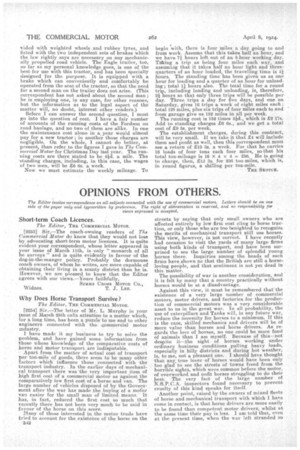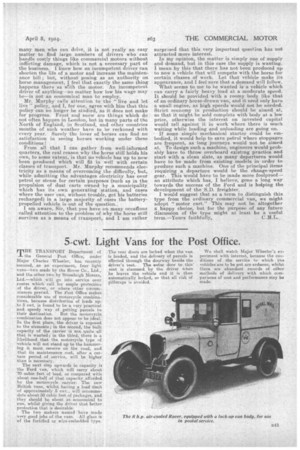OPINIONS FROM OTHERS.
Page 26

Page 27

If you've noticed an error in this article please click here to report it so we can fix it.
The Editor invites correspon-dence on all subjects connected with the use of commercial motors. Letters should he on one side of the paper only and typewrittem by preference. The right of abbreviation as reserved, and no responsibility for
views expressed is accepted.
Short-term Coach Licences.
The Editor, THE COMMERCIAL MOTOR.
[22531 Sir,—The coach-owning readers of The Commercial Motor do know that they would not lose by advocating short-term motor licences. It is quite evident your correspondent, whose letter appeared in your issue of March 11th, is only "monarch of all he surveys" and is quite evidently in favour of the dog-in-the-manger policy. Probably the dormouse coach owners, of whom he writes, are more capable of obtaining their living in a scanty district than he is. However, we are pleased to know that the Editor irgrees with our views.—Yours faithfully,
SIMMS CROSS MOTOR Co., Widnes. T. J. LEE.
Why Does Horse Transport Survive?
The Editor, THE COMMERCIAL MOTOR.
[2254] Sir,—The letter of Mr. L. Murphy in your issue of March 25th calls attention to a matter which, for a-long time, has been a. puzzle-to tie •and to other engineers connected with the cerionercial motor industry.
I have made it my busieessto try to solve the 'problem, and have gained some information from those Whose knowledge of the comparative costs. of horse and motor transportare indisputable.
Apart from the matter of actual east of transport per ton-mile of goods, there seem to be many other factors which influence those connected with the transport industry. In the earlier days of mechanical transport there was the very important item of high first cost of a commercial motor as against the comparatively low first cost of a, horse and van. The large number of vehicles disposed of by the Government after the war has made the buying of a motor van easier for the small man of limited means. It has, in fact, reduced the first cost so much that recently there has not been very much to be said in favour of the horse on this score.
Many of those interested in the motor trade have tried to account for the existence of the horse on the L42 streets by saying that only small owners who are affected entirely by low first cost cling to horse traction, or only those who are toe benighted to recognize the merits of mechanical transport still use horses. This view, however, is not correct. I have recently had occasion to visit the yards of many large firms using both kinds of transport, and have been surprised to see the large number of splendid young horses there. Inquiries among the heads of such firms have shown ne that the British are still a horseloving peoPle, and that sentiment is not yet dead in this matter.
The possibility of war is another consideration, and it is felt by many that a country practically without horses would be at a disadvantage.
Against this view, it must be remembered that the existence of a very large number -of commercial motors, motor drivers, and factories for the, production of commercial motors was a very considerable asset to us in the great war. In all probability, the use of caterpillars and Tanks will, in any future war, reduce the necessity for horses to a-minimum. If this is the case, skilled mechanics and drivers will be of more value than horses and horse drivers. As regards the love of horses; no one could be more fond of animals than I am myself. Because of this—not despite it—the sight of horses working under ordinary business conditions pulling heavy loads, especially in hilly districts and during hot weather, is, to me, not a. pleasant one I should have thought that any, true lover of 'horses would have been only too glad to see the streets of towns freed from the horrible sights, which were common before the motor, of overWorltecl and unfit horses struggling to do their
est. The very fact of the large number of .S.P.C.A. inspectors found necessary to prevent cruelty of this kind speaks for itself. 'Another point, raised by the owners of mixed fleets of horse and mechanical transport with which I have come in contact, is that horse drivers are more easily to be found than competent motor drivers, whilst at the same time their pay is less. I am told that, even at the present time, when the war left Stranded so
many men, who can drive, it is not really an easy matter to find large numbers of drivers who can handle costly things like commercial motors without inflicting damage, which is not a necessary part of the business. I know how an incompetent driver can 'shorten the life of a motor and increase the maintenance bill ; but, without posing as an -authority on horse management, I feel that exactly the same thing happens there as NiTith the motor. An incompetent driver of anything—no matter how low his wage may he—is not an economical man to employ,
Mr. Murphy calls attention to the "live and let live " policy, and I, for one, agree with him that this policy can no longer be studied, as it does not make for progress. Frost and snow are things •which do not often happen in London, but in many parts of the North of England, in Scotland, and other countries months of such weather have to be reckoned with every year. Surely the lover of horses can find no satisfaction in seeing horses working under these conditions !
From all that I can gather from well-informed quarters, the real reason why the horse still holds his own, to some extent, is that no vehicle has up to now been produced which will fit in well with certain classes of transport. Mr. Murphy recommends electricity as a means of overcoming the difficulty, but, while admitting the advantages electricity has over petrol or steam for certain purposes (such as in the propulsion of dust carts owned by a municipality. which has its own generating station, and cases h where the user 'can, without trouble, get is batteries recharged). in a large majority of cases the batterypropelled vehicle is out of the question..
I am aware, Sir, that you have on many occalions called attention to the problem of why the horse still survives as a means of transport, and I am rather
surprised that this very important question has not attracted more interest.
In my opinion, the matter is simply one of -supply and demand, but in this case the supply is wanting.
mean by this that there has not been produced up to now a vehicle that will compete with the horse for certain classes of work. Let that vehicle make its appearance, and I feel sure that a demand will follow.
What seems to me to be wanted is a vehicle which can carry a fairly heavy load at a moderate speed. It should be provided with a roomy body. like that of an ordinary horse-drawn van, and it need only have a small engine, as high speeds would not be needed. Strict economy in production should be aimed at, so that it rnight be sold complete with-hody at a low price, otherwise the interest on invested capital would tell against it in work where there is inne'n waiting while loading and unloading are going on.
If some simple mechanical starter could be embodied, it would help to save petrol where stoppages are frequent, as long journeys would not be aimed at. To design such a machine, engineers would probably have to throw overboard existing practice and start with a, clean slate, as many departures would have to be made from existing models in order to produce such a machine. One of the principal items requiring a_ departure would be the change-speed gear. This would have to be made more foolproof---an attribute which has, I believe, gone a long way towards the success of the Ford and is helping the develop_mentaaf the S.D. freighter.
I would suggest that as a term to distinguish this type from the ordinary commercial van, we might adopt "motor cart." This may not be altogether it happy choice, but for the purpose of any future discussion of the type might at least be a useful ten-IL—Yours faithfully, C.M.L.






























